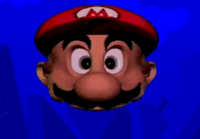Mario in Real Time
Mario in Real Time (also known as MIRT) is an interactive system that was introduced around 1992[1], and has since been used by Nintendo in various trade fairs. Thought up by Minoru Arakawa, MIRT is notable for introducing Charles Martinet as Mario's voice (prior to his videogame debut in Mario's FUNdamentals).
MIRT displays Mario on a screen, through which he can talk to those attending the trade fair. Charles Martinet himself (previously Stevie Coyle[1]) works the device, standing out of view and reciting Mario's lines, which are instantly reiterated by the hero. Martinet also provides Mario's movement through sensors courtesy of Simgraphics Engineering, who developed the VActor technology on which MIRT works. (Mario sound effects and various impossible movements are also available to Martinet.[2][dead link]) Although Martinet is hidden from the audience, he can see and hear them through a hidden camera and microphone. In addition to trade shows, an early Mario in Real Time was used to animate Mario's face in Mario Teaches Typing and its sequel.
Martinet occasionally voices an off-screen Luigi (as well as Mama and Papa) in MIRT; this is also how Luigi's current voice originated.[3] A Wario in Real Time (WIRT) and Donkey Kong in Real Time (DKIRT) also exist[3]. The former was used at the Winter CES 1994[4] while the latter was present at the 1994 VDSA expo[5]. Charles Martinet himself appeared on-screen with MIRT software at E3 2006.[6] A more advanced version of MIRT software appeared at San Diego Comic Con 2012 and the Nintendo World Luigi's Mansion: Dark Moon launch event in New York in 2013. The former featured Martinet (as Mario) answering questions from fans,[7] while the latter involved Luigi welcoming fans to the Dark Moon launch event.[8]

